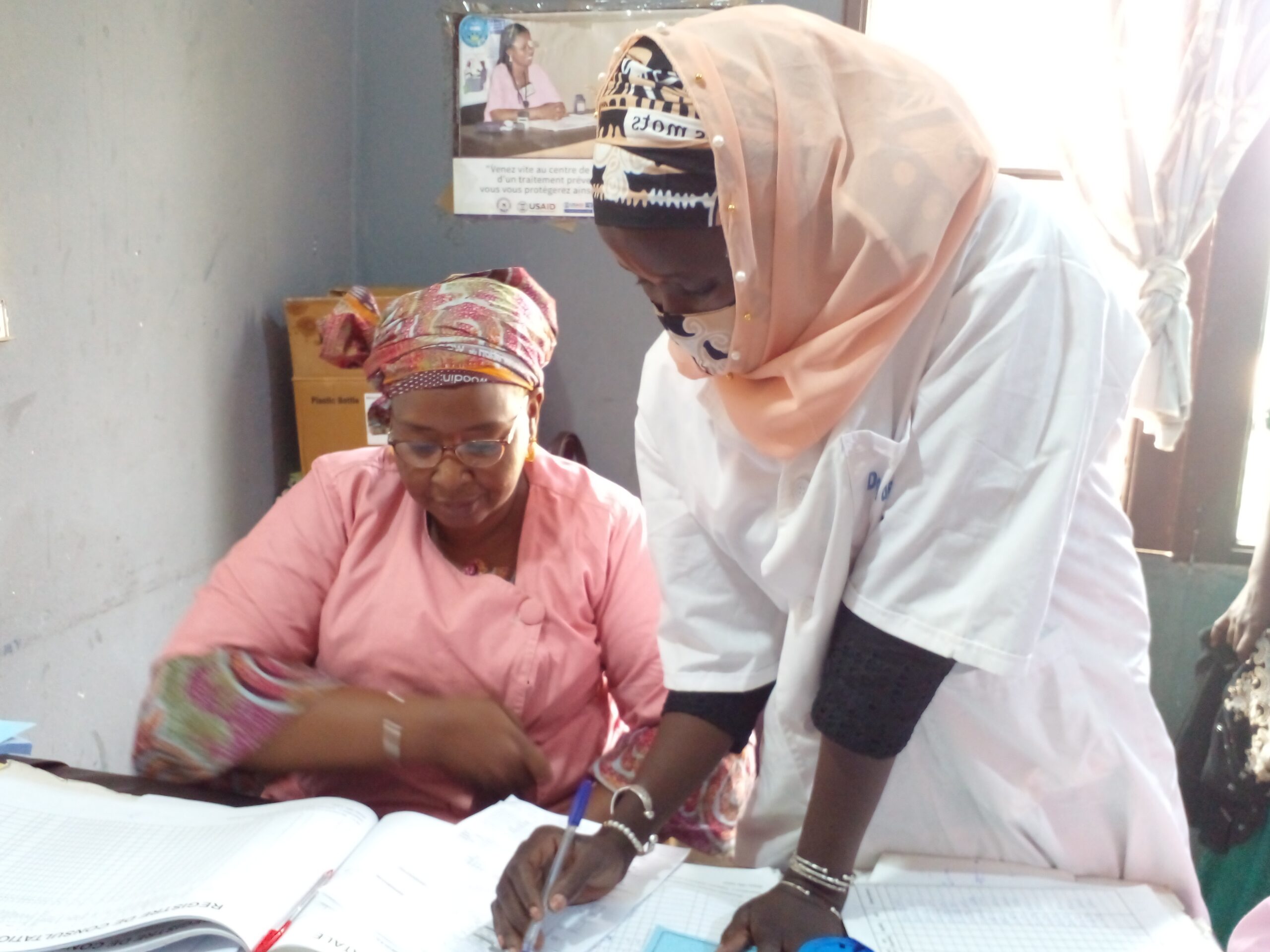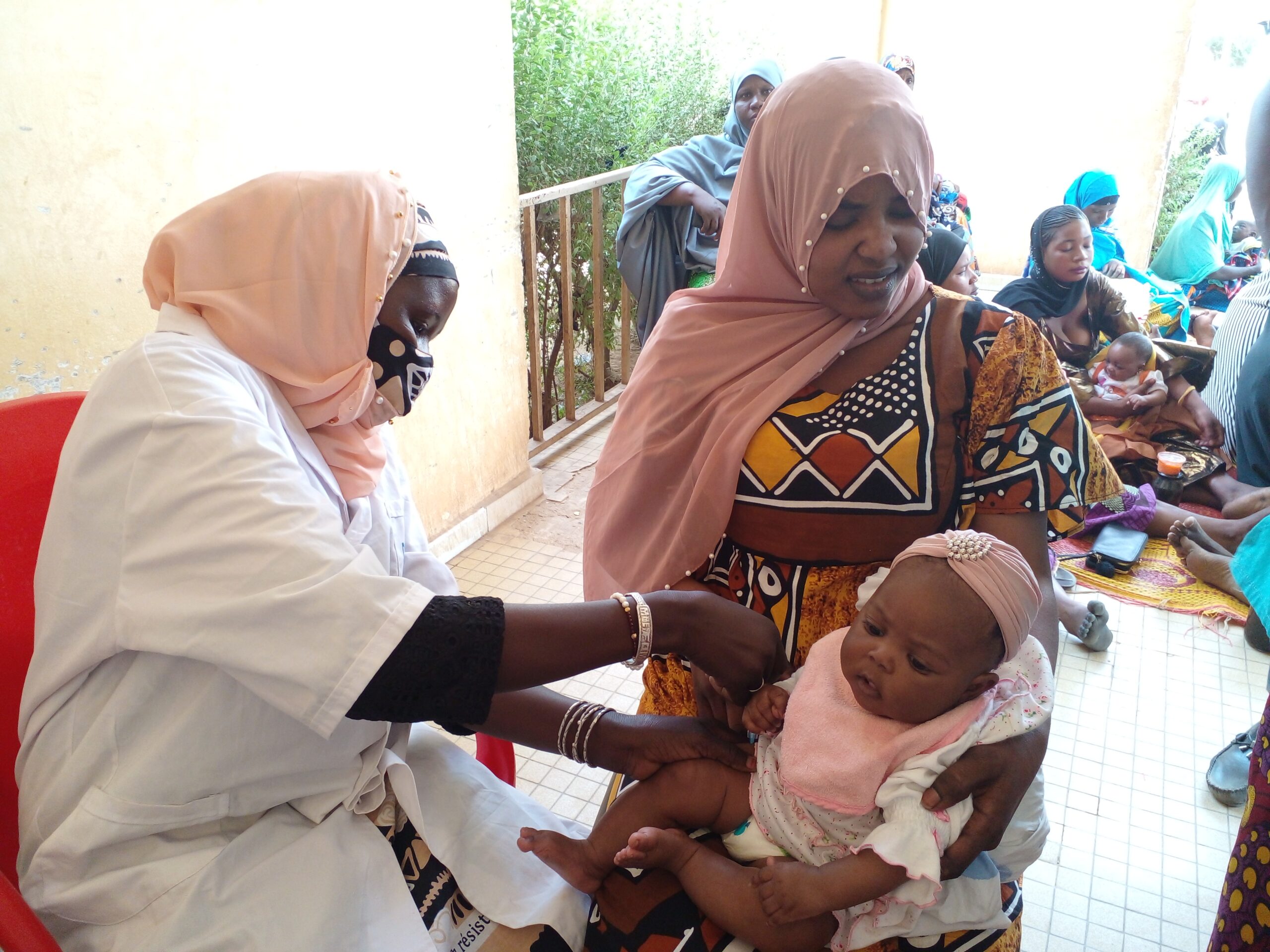A Mother in Mali Develops Her Skills to Help Other Mothers and Babies Through A MOMENTUM Training
Published on May 4, 2022

The actions of one person can reverberate far and wide. Such is the case with Fatoumata Ousmane, a mother of three who grew up in the village of Tacharane in the Gao region of northeastern Mali. A long-time health worker in the community around Tacharane, Fatoumata attended a reproductive health policies, standards, and procedures training provided by MOMENTUM Integrated Health Resilience. She had spent years working with mothers and babies in the Tacharane area but was eager to improve her skills. There was urgency because Mali has one of the highest maternal and child death rates in Sub-Saharan Africa, according to the Mali Demographic & Health Survey 2018.
MOMENTUM Training Builds on Existing Health Care Skills
Fatoumata recalls the training goal was to strengthen the capacity of health workers to respect accepted norms and standards related to maternal, newborn, and child health (MNCH) in Mali.
“Before, I did not know how to fill out a partogram (used to monitor a pregnant woman’s wellbeing and progress during active labor) but now I easily use them. I had two cases of stillbirths before the training and have not recorded any cases since the training,” she explains. Fatoumata’s use of the partogram gave her guidelines for when to refer obstetric emergencies rather than waiting to see what happens. Early action is vital to reducing instances of stillbirth.

Fatoumata’s interest and participation during the training caught the eye of Dr. Lazare Coulibaly, Technical Director for MOMENTUM Integrated Health Resilience Mali. He noted that Fatoumata “is courageous and very committed to the health of the community. She loves her job and shows a willingness to improve in what she does.”
It is hard to miss Fatoumata’s devotion to the health and wellbeing of those in her community and surrounding environs. She has been a health worker since February 2009, and it is a point of pride for her. She serves as Technical Director of the Tacharane Community Health Center, where she is in charge of implementing a minimum package of activities including consultations for malaria, diarrhea, acute respiratory infection, and more. She also oversees follow-up care for healthy children, including vaccinations, as well as providing prenatal consultations, deliveries, and postnatal consultations including family planning.
Among Fatoumata’s proudest achievements was holding awareness sessions with men in her village who were hostile to prenatal consultations and voluntary family planning services. “After a while, the men asked women to join them in those sessions,” she recalls. “Then they suggested the idea of a health hut to bring services closer to the community.” Village residents raised $1,272 (or 700,000 West African CFA francs) to build huts in two villages more than 25 km apart. “I am proud of that successful initiative by the communities, with my help, and I feel useful in my work,” she says.
The MOMENTUM training was a turning point for her. “It was during that training that I had clarification on the use of Sayana Press (a long-acting, reversible injectable contraceptive),” she says. “I learned all about the product and the way to administer it. I even practiced injections during the training, for both Sayana Press and Vitamin K1.”
Tackling Low Contraceptive Rates and Vaccines One Mother at a Time
In the Gao region of Mali, where the contraceptive prevalence rate is a mere 3.3 percent, Fatoumata’s services and compassion are sorely needed. “It is important to discuss family planning choices with women so they can be aware of the full range (of services) available, and so it can facilitate their acceptance of at least one method. That can ensure their comfort by spacing births and planning pregnancies as they wish,” explains Fatoumata.
Fatoumata is similarly invested in ensuring that children receive their vaccines on schedule. It was in the health data analysis sessions during the training that she recognized a drop in the number of children in the Gao region receiving the first dose of vaccines and the last: “To reduce this gap, it is essential to increase mothers’ awareness of the need to complete the full vaccine course.” At the health center, discussions with mothers now focus on vaccination schedules with an emphasis on the next vaccine their children should receive. She adds that she always integrates awareness about family planning during vaccination sessions. This was implemented after Fatoumata went through the MOMENTUM training.

As busy as she is as a health care worker and mother of three, Fatoumata continues to fight for the health of mothers and babies in her community. “For all mothers, but especially for women in my community, I hope they avoid complications during pregnancy and childbirth,” she asserts. “No woman should die while giving birth.”
For more information about our work in Mali, read here.

